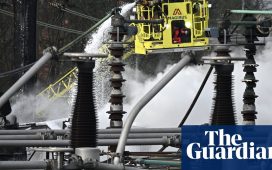Stay informed with free updates
Simply sign up to the Oil & Gas industry myFT Digest — delivered directly to your inbox.
Climate campaigners are launching legal action to block the development of the Rosebank oilfield in the North Sea, saying the UK’s approval of the project violates its legal obligations to target net zero carbon emissions.
Uplift and Greenpeace on Monday will apply separately to Edinburgh’s Court of Session, Scotland’s highest civil court, for a judicial review of the North Sea Transition Authority’s decision to allow Norway’s state-backed Equinor and its partner Ithaca to develop the field, about 80 miles off the coast of the Shetland islands.
The action by the environmentalist groups comes days after countries at the COP28 climate summit in Dubai agreed to transition away from fossil fuels as they seek to reach a global target of net zero emissions by 2050.
The UK regulator’s decision in September to approve the project, which Equinor estimates will be able to produce about 300mn barrels over its lifetime — the equivalent of about three days of global demand — enraged campaigners and the Scottish Greens, who govern in Scotland with the pro-independence Scottish National party.
In their application to Scotland’s top civil court, the groups said that approving the development of Rosebank was unlawful because it ignored the impact of emissions from burning its oil and was not compatible with the UK’s plans to cut greenhouse emissions. They added that UK taxpayers would carry almost all the risk from the project while the companies receive around £3bn in tax relief.
“If Rosebank goes ahead, the UK will blow its own plans to stay within safe climate limits,” said Tessa Khan, Uplift’s executive director. “What’s clear from this year’s climate talks is that the UK government, like other oil producing countries, is failing to protect our world from dangerous climate change. But rather than lose hope, we can and will hold them to account.”
The Rosebank field has become a key battleground in the UK’s climate debate. Rishi Sunak’s Conservative administration has loosened its commitment to stringent targets to reach a legally binding goal of net zero by 2050, and has instead emphasised the role of domestic fossil fuel production in ensuring the UK’s energy security.
The Tory government, which is trailing behind the opposition Labour party in opinion polls ahead of a general election expected next year, has diluted key climate policies, including delaying a planned ban on new pure petrol and diesel cars from 2030 to 2035.
A government spokesperson said the UK would “robustly defend” any challenge and rejected the campaign group’s claims. The UK would continue backing an industry that supports 200,000 jobs and was expected to pay about £50bn in tax over the next five years, the spokesperson added.
Equinor in a note on its website acknowledged and respected “differing views” about the Rosebank field. The note, which was posted previously and was not in response to Monday’s court action from activists, said that there were “sound and rational reasons for developing” the field, adding that the plan would not increase the UK’s projected emissions.
The UK’s oil and gas production has declined about 13 per cent over the past decade, according to trade body Offshore Energies UK.
Supporters of developing new oil and gasfields within the UK said that polluting fuels would continue to power the economy for decades and that producing them locally was a more environmentally friendly option than importing fuel from other countries.
But, Areeba Hamid, Greenpeace UK’s co-executive director, said that Rosebank’s development would not benefit the UK’s energy security or cut bills for consumers because the output would be exported.
“It’s just more proof that this government is putting the profits of oil and gas companies over the British public and the planet,” she said. “Rosebank’s development simply cannot go ahead.”
Climate Capital

Where climate change meets business, markets and politics. Explore the FT’s coverage here.
Are you curious about the FT’s environmental sustainability commitments? Find out more about our science-based targets here










